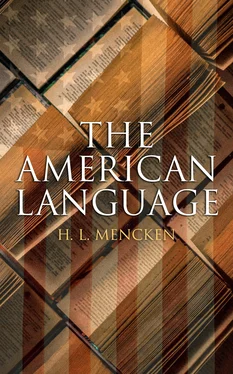Table of Contents
—What English and American laymen have thus observed has not escaped the notice of continental philologists. The first edition of Bartlett, published in 1848, brought forth a long and critical review in the Archiv für das Studium der neueren Sprachen und Literaturen by Prof. Felix Flügel, 31and in the successive volumes of the Archiv, down to our own day, there have been many valuable essays upon Americanisms, by such men as Herrig, Koehler and Koeppel. Various Dutch philologists, among them Barentz, Keijzer and Van der Voort, have also discussed the subject, and a work in French has been published by G. A. Barringer. 32That, even to the lay Continental, American and English now differ considerably, is demonstrated by the fact that many of the popular German Sprachführer appear in separate editions, Amerikanisch and Englisch . This is true of the "Metoula Sprachführer" published by Prof. F. Lanenscheidt 33and of the "Polyglott Kuntz" books. 34The American edition of the latter starts off with the doctrine that " Jeder, der nach Nord-Amerika oder Australien will, muss Englisch können ," but a great many of the words and phrases that appear in its examples would be unintelligible to many Englishmen— e. g. , free-lunch , real-estate agent , buckwheat , corn (for maize ), conductor , pop-corn and drug-store —and a number of others would suggest false meanings or otherwise puzzle— e. g. , napkin , saloon , wash-stand , water-pitcher and apple-pie . 35To these pedagogical examples must be added that of Baedeker, of guide-book celebrity. In his guide-book to the United States, prepared for Englishmen, he is at pains to explain the meaning of various American words and phrases.
A philologist of Scandinavian extraction, Elias Molee, has gone so far as to argue that the acquisition of correct English, to a people grown so mongrel in blood as the Americans, has become a useless burden. In place of it he proposes a mixed tongue, based on English, but admitting various elements from the other Germanic languages. His grammar, however, is so much more complex than that of English that most Americans would probably find his artificial "American" very difficult of acquirement. At all events it has made no progress. 36
§ 5
The Characters of American
Table of Contents
—The characters chiefly noted in American speech by all who have discussed it are, first, its general uniformity throughout the country, so that, dialects, properly speaking, are confined to recent immigrants, to the native whites of a few isolated areas and to the negroes of the South; and, secondly, its impatient disdain of rule and precedent, and hence its large capacity (distinctly greater than that of the English of England) for taking in new words and phrases and for manufacturing new locutions out of its own materials. The first of these characters has struck every observer, native and foreign. In place of the local dialects of other countries we have a general Volkssprache for the whole nation, and if it is conditioned at all it is only by minor differences in pronunciation and by the linguistic struggles of various groups of newcomers. "The speech of the United States," said Gilbert M. Tucker, "is quite unlike that of Great Britain in the important particular that here we have no dialects." 37"We all," said Mr. Taft during his presidency, "speak the same language and have the same ideas." "Manners, morals and political views," said the New York World, commenting upon this dictum, "have all undergone a standardization which is one of the remarkable aspects of American evolution. Perhaps it is in the uniformity of language that this development has been most noteworthy. Outside of the Tennessee mountains and the back country of New England there is no true dialect." 38"While we have or have had single counties as large as Great Britain," says another American observer, "and in some of our states England could be lost, there is practically no difference between the American spoken in our 4,039,000 square miles of territory, except as spoken by foreigners. We, assembled here, would be perfectly understood by delegates from Texas, Maine, Minnesota, Louisiana, or Alaska, or from whatever walk of life they might come. We can go to any of the 75,000 postoffices in this country and be entirely sure we will be understood, whether we want to buy a stamp or borrow a match." 39"From Portland, Maine, to Portland, Oregon," agrees an English critic, "no trace of a distinct dialect is to be found. The man from Maine, even though he may be of inferior education and limited capacity, can completely understand the man from Oregon." 40
No other country can show such linguistic solidarity, nor any approach to it—not even Canada, for there a large part of the population resists learning English altogether. The Little Russian of the Ukraine is unintelligible to the citizen of Petrograd; the Northern Italian can scarcely follow a conversation in Sicilian; the Low German from Hamburg is a foreigner in Munich; the Breton flounders in Gascony. Even in the United Kingdom there are wide divergences. 41"When we remember," says the New International Encyclopaedia 42"that the dialects of the countries ( sic ) in England have marked differences—so marked, indeed that it may be doubted whether a Lancashire miner and a Lincolnshire farmer could understand each other—we may well be proud that our vast country has, strictly speaking, only one language." This uniformity was noted by the earliest observers; Pickering called attention to it in the preface to his Vocabulary and ascribed it, no doubt accurately, to the restlessness of the Americans, their inheritance of the immigrant spirit, "the frequent removals of people from one part of our country to another." It is especially marked in vocabulary and grammatical forms—the foundation stones of a living speech. There may be slight differences in pronunciation and intonation—a Southern softness, a Yankee drawl, a Western burr—but in the words they use and the way they use them all Americans, even the least tutored, follow the same line. One observes, of course, a polite speech and a common speech, but the common speech is everywhere the same, and its uniform vagaries take the place of the dialectic variations of other lands. A Boston street-car conductor could go to work in Chicago, San Francisco or New Orleans without running the slightest risk of misunderstanding his new fares. Once he had picked up half a dozen localisms, he would be, to all linguistic intents and purposes, fully naturalized.
Of the intrinsic differences that separate American from English the chief have their roots in the obvious disparity between the environment and traditions of the American people since the seventeenth century and those of the English. The latter have lived under a stable social order, and it has impressed upon their souls their characteristic respect for what is customary and of good report. Until the war brought chaos to their institutions, their whole lives were regulated, perhaps more than those of any other people save the Spaniards, by a regard for precedent. The Americans, though largely of the same blood, have felt no such restraint, and acquired no such habit of conformity. On the contrary, they have plunged to the other extreme, for the conditions of life in their new country have put a high value upon the precisely opposite qualities of curiosity and daring, and so they have acquired that character of restlessness, that impatience of forms, that disdain of the dead hand, which now broadly marks them. From the first, says a recent literary historian, they have been "less phlegmatic, less conservative than the English. There were climatic influences, it may be; there was surely a spirit of intensity everywhere that made for short effort." 43Thus, in the arts, and thus in business, in politics, in daily intercourse, in habits of mind and speech. The American is not, in truth, lacking in a capacity for discipline; he has it highly developed; he submits to leadership readily, and even to tyranny. But, by a curious twist, it is not the leadership that is old and decorous that fetches him, but the leadership that is new and extravagant. He will resist dictation out of the past, but he will follow a new messiah with almost Russian willingness, and into the wildest vagaries of economics, religion, morals and speech. A new fallacy in politics spreads faster in the United States than anywhere else on earth, and so does a new fashion in hats, or a new revelation of God, or a new means of killing time, or a new metaphor or piece of slang.
Читать дальше












